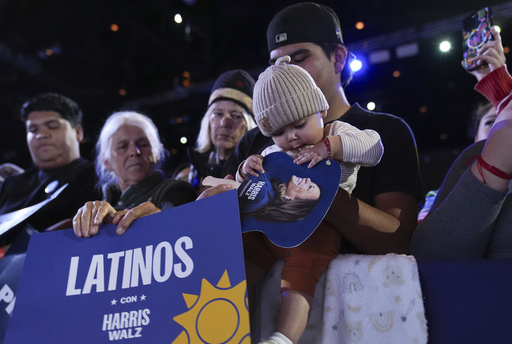In Washington, Brian Leija, a 31-year-old entrepreneur from Belton, Texas, expressed his awareness of the rising number of Latino men in his age group who opted to vote for Donald Trump this election cycle. Having previously supported Trump in both 2016 and 2020, Leija pointed out that he has reaped the benefits from the former president’s economic initiatives, particularly the tax cuts. He stated, “As a blue-collar worker, tax breaks for small businesses suit my career well.”
Similarly, DaSean Gallisaw, a consultant living in Fairfax, Virginia, shared that his decision to vote for Trump stemmed from the disconnect he perceives between Democratic rhetoric and actions. Reflecting on this sentiment, the 25-year-old Black man mentioned, “Democrats have not truly fulfilled their commitments to minority communities for a long time.” After having voted for Trump in two consecutive elections, he acknowledged that he felt Trump had improved outreach efforts toward minority communities this year.
According to a comprehensive survey conducted by AP VoteCast, which analyzed the voting behavior of more than 120,000 citizens, Trump increased his support among Black and Latino voters compared to 2020, especially among younger men under 45. Despite Kamala Harris winning significant portions of the Black and Latino vote, these gains were not enough to secure her a victory in the presidential race, primarily due to Trump’s improved performance in these demographics.
Among voters in general, the economy and job opportunities were highlighted as the predominant concerns, a sentiment echoed by Black and Hispanic voters as well. Notably, around 30% of young Black men under 45 supported Trump, demonstrating a significant increase from 2020. Additionally, young Latino men revealed a greater willingness to vote for Trump this cycle, with approximately half supporting Harris, down from 60% who backed Biden.
Juan Proaño, CEO of LULAC—America’s largest and oldest civil rights group for Hispanic citizens—highlighted that Trump’s economic messaging significantly resonated with Latino voters. Proaño stated, “It’s clear that Latinos played a crucial role in the decision on who would be the next president, and they helped reelect Donald Trump. Latino men were particularly drawn to the president’s populist approach, focusing on issues like inflation, wages, and immigration reform.”
A minister involved with outreach in Black American religious communities, the Rev. Derrick Harkins, noted how Trump’s hypermasculine appeal attracted certain younger men of color. He opined, “Trump’s exaggerated machismo has resonated among young men across racial lines, not just a small segment, but enough to make a notable impact.”
This election saw a shift in priorities among Black and Latino voters compared to 2020. About 40% of young voters under 45 rated the economy as the primary issue, which contrasted with older voters who often cited immigration as a top concern. Many young Black voters expressed a bleak outlook on the economy, with a majority stating it was “not so good” or “poor,” echoing sentiments held by older Black voters. Likewise, Latinos across various age groups also reported unfavorable views on the economy.
For first-time voter Alexis Uscanga, a 20-year-old college student from Brownville, Texas, economic issues and immigration were central to his support for Trump. Uscanga remarked, “Prices have skyrocketed for me—everything from gas to groceries—and that’s a significant concern, alongside immigration matters.” Having worked in various roles, Uscanga contrasted his current economic experience with what he felt were better opportunities during the Trump presidency, despite initial reservations about Trump due to his rhetoric in 2016.
While the increase in voting for Trump among Black and Latino men played a pivotal role, it’s important to recognize that he still relied heavily on the backing of a majority of white voters. Terrance Woodbury, co-founder of HIT Strategies, noted the emergence of men of color as pivotal swing voters: “We’ve talked about suburban women influencing elections; now, younger men of color are emerging as potential swing voters, less tied to party lines and more likely to shift allegiances.”
The desire for effective leadership also made Trump appealing, with a national majority viewing him as a strong leader, compared to slightly fewer than half who felt the same about Kamala Harris. Particularly among Hispanic voters, Trump’s strong leadership perception increased, with about 60% of Hispanic men responding positively, compared to only 43% in 2020. The perception of strong leadership similarly rose among Black men and women, with many doubling their assessment of Trump compared to previous years.
David Means, a Black purchasing manager in Atlanta, chose not to vote this election, believing neither Trump nor Harris reached out effectively to Black men. However, he expressed satisfaction with the election results, stating, “I was indifferent about either candidate but preferred not to see a woman in such a position unless she was exceptionally capable, like Judge Judy.”


